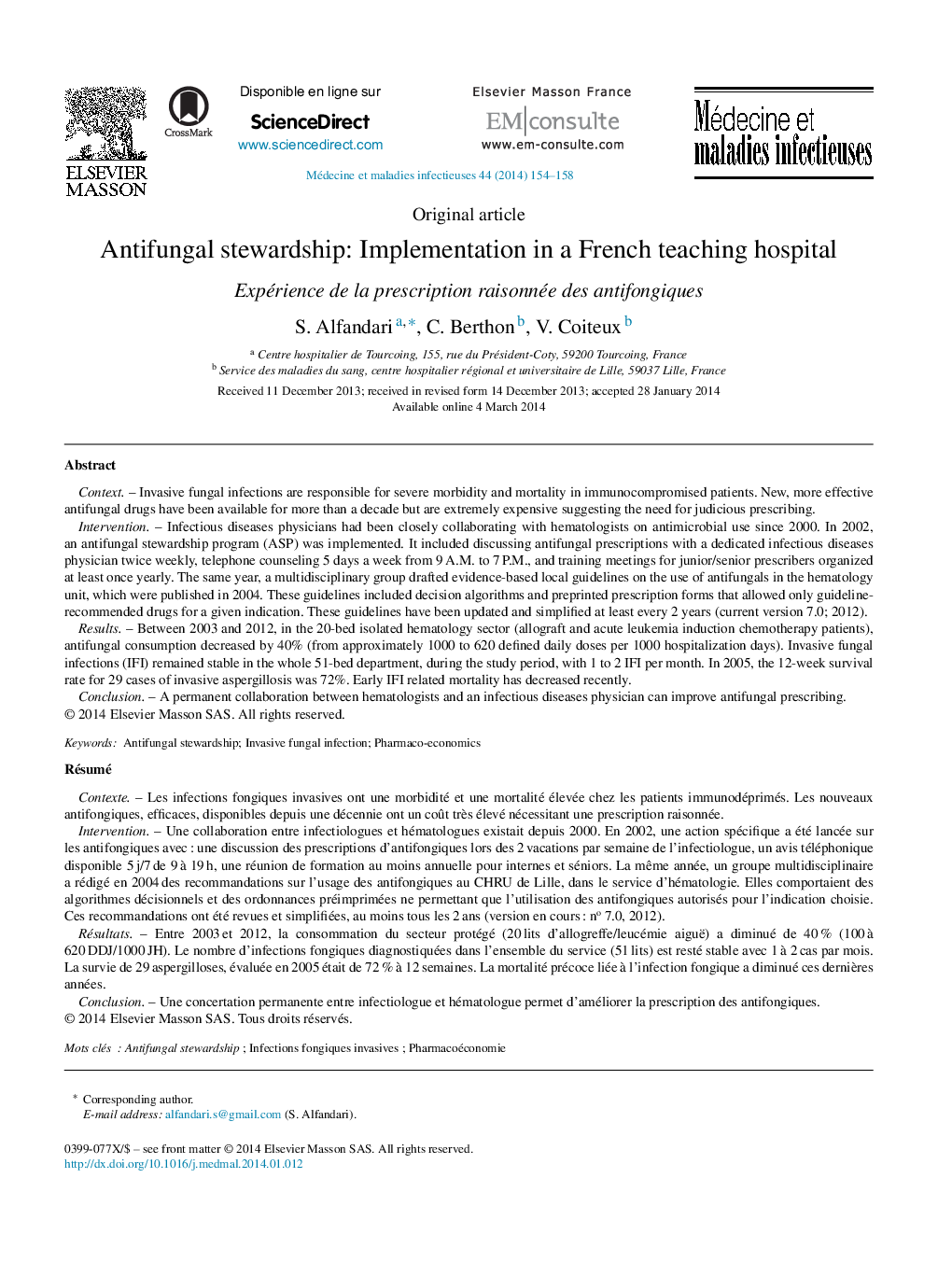| کد مقاله | کد نشریه | سال انتشار | مقاله انگلیسی | نسخه تمام متن |
|---|---|---|---|---|
| 3412577 | 1224234 | 2014 | 5 صفحه PDF | دانلود رایگان |
ContextInvasive fungal infections are responsible for severe morbidity and mortality in immunocompromised patients. New, more effective antifungal drugs have been available for more than a decade but are extremely expensive suggesting the need for judicious prescribing.InterventionInfectious diseases physicians had been closely collaborating with hematologists on antimicrobial use since 2000. In 2002, an antifungal stewardship program (ASP) was implemented. It included discussing antifungal prescriptions with a dedicated infectious diseases physician twice weekly, telephone counseling 5 days a week from 9 A.M. to 7 P.M., and training meetings for junior/senior prescribers organized at least once yearly. The same year, a multidisciplinary group drafted evidence-based local guidelines on the use of antifungals in the hematology unit, which were published in 2004. These guidelines included decision algorithms and preprinted prescription forms that allowed only guideline-recommended drugs for a given indication. These guidelines have been updated and simplified at least every 2 years (current version 7.0; 2012).ResultsBetween 2003 and 2012, in the 20-bed isolated hematology sector (allograft and acute leukemia induction chemotherapy patients), antifungal consumption decreased by 40% (from approximately 1000 to 620 defined daily doses per 1000 hospitalization days). Invasive fungal infections (IFI) remained stable in the whole 51-bed department, during the study period, with 1 to 2 IFI per month. In 2005, the 12-week survival rate for 29 cases of invasive aspergillosis was 72%. Early IFI related mortality has decreased recently.ConclusionA permanent collaboration between hematologists and an infectious diseases physician can improve antifungal prescribing.
RésuméContexteLes infections fongiques invasives ont une morbidité et une mortalité élevée chez les patients immunodéprimés. Les nouveaux antifongiques, efficaces, disponibles depuis une décennie ont un coût très élevé nécessitant une prescription raisonnée.InterventionUne collaboration entre infectiologues et hématologues existait depuis 2000. En 2002, une action spécifique a été lancée sur les antifongiques avec : une discussion des prescriptions d’antifongiques lors des 2 vacations par semaine de l’infectiologue, un avis téléphonique disponible 5 j/7 de 9 à 19 h, une réunion de formation au moins annuelle pour internes et séniors. La même année, un groupe multidisciplinaire a rédigé en 2004 des recommandations sur l’usage des antifongiques au CHRU de Lille, dans le service d’hématologie. Elles comportaient des algorithmes décisionnels et des ordonnances préimprimées ne permettant que l’utilisation des antifongiques autorisés pour l’indication choisie. Ces recommandations ont été revues et simplifiées, au moins tous les 2 ans (version en cours : no 7.0, 2012).RésultatsEntre 2003 et 2012, la consommation du secteur protégé (20 lits d’allogreffe/leucémie aiguë) a diminué de 40 % (100 à 620 DDJ/1000 JH). Le nombre d’infections fongiques diagnostiquées dans l’ensemble du service (51 lits) est resté stable avec 1 à 2 cas par mois. La survie de 29 aspergilloses, évaluée en 2005 était de 72 % à 12 semaines. La mortalité précoce liée à l’infection fongique a diminué ces dernières années.ConclusionUne concertation permanente entre infectiologue et hématologue permet d’améliorer la prescription des antifongiques.
Journal: Médecine et Maladies Infectieuses - Volume 44, Issue 4, April 2014, Pages 154–158
